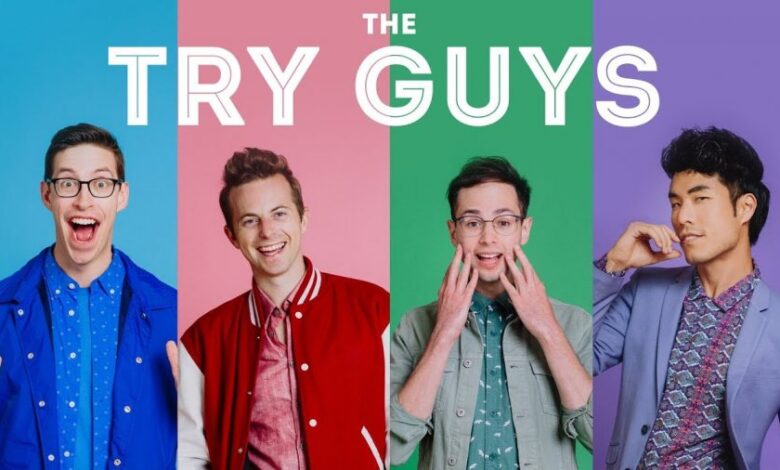Try Guys Ned: The Rise, Fall, and Redefinition of Internet Fame

Introduction: When Internet Stars Become Cultural Symbols
Try Guys Ned ,in the past decade, the entertainment industry has changed so dramatically that digital creators are now competing with television actors and Hollywood celebrities for cultural influence. Few groups embody this shift better than the Try Guys, the YouTube comedy-turned-lifestyle brand that broke out from BuzzFeed and built its own empire. Among its founding members,Try Guys Ned Fulmer—famously branded as the “wife guy”—emerged as both a beloved character and, later, a controversial figure. The story of “Try Guys Ned” is not merely about one man’s internet journey; it is also about how audiences construct, project, and then deconstruct their digital heroes.
What makes Ned’s trajectory so fascinating is not just the surface-level scandal that shook fans, but the deeper questions it raises about authenticity, parasocial relationships, and the fragile scaffolding of online celebrity. To understand “Try Guys Ned” is to explore not only the man but the ecosystem of digital fame that elevated him to a pedestal and then pulled him down.
The Try Guys Phenomenon: A New Blueprint for Entertainment

Try Guys Ned ,the Try Guys were born in the creative cauldron of BuzzFeed, where short-form, quirky video content ruled the algorithm. When the group first uploaded videos of themselves attempting ridiculous challenges—such as trying labor pain simulators, drag makeovers, or gourmet cooking—they tapped into a universal recipe: vulnerability plus humor equals virality.
Try Guys Ned Fulmer carved his niche early on. While Keith was the foodie, Zach the experimental oddball, and Eugene the enigmatic yet stylish presence, Ned positioned himself as the everyman, the family guy. His constant references to his wife, Ariel, became not just a running joke but a part of his personal brand. Fans didn’t just laugh at his antics; they admired him for his relatability, his “wholesome dad energy,” and the stability he represented amidst the internet’s often chaotic personalities.
When the Try Guys left BuzzFeed to form their own production company, their influence magnified. They became business owners, authors, and touring performers, crafting an empire that many YouTube collectives could only dream of. Within this expanding brand, Ned’s family-oriented persona became both his superpower and, later, his Achilles heel.
The Persona of “The Wife Guy”: Internet Identity at Its Peak
Internet fame is rarely built on raw talent alone—it thrives on identity. Try Guys Ned leaned into his role as the “wife guy,” a term that encapsulates men who build much of their public persona around adoring their wives. For years, fans celebrated this image, viewing him as a counterpoint to stereotypical internet masculinity. He wasn’t about flexing wealth or bravado; he was about love, marriage, and suburban sincerity.
This branding worked brilliantly for a time. Fans quoted his “I love my wife” lines, memes circulated celebrating his devotion, and his relationship with Ariel became almost as much of the Try Guys narrative as the content itself. His wife even appeared in videos, podcasts, and promotional campaigns, which deepened the image of Ned as a man whose personal and professional lives were seamlessly integrated.
But there is a fragile truth about digital personas: the tighter they are bound to personal authenticity, the more catastrophic the fallout if they break. By staking his identity so heavily on being the perfect partner, Ned left no wiggle room for human error in the eyes of his audience. The wife guy narrative became a golden cage, and when cracks appeared, they shattered the illusion in an almost cinematic fashion.
The Scandal: When Image Meets Reality
When news broke of Try Guys Ned Fulmer’s alleged affair in 2022, the internet exploded. Screenshots, witness accounts, and social media threads spread faster than any official statement could contain. What made the scandal resonate so deeply wasn’t just the act itself—it was the betrayal of the very image Ned had meticulously crafted.
For fans, this wasn’t simply gossip. It felt personal. Many had invested emotionally in the “perfect family man” story; his brand had invited them into his living room, into his marriage, into the idea that love and loyalty were marketable virtues. When the façade cracked, audiences didn’t just feel disappointment; they felt deceived.
The Try Guys acted swiftly, distancing themselves from Try Guys Ned and issuing statements that emphasized accountability and integrity. The decision to remove a founding member wasn’t just about moral optics; it was about preserving the credibility of their entire brand. What followed was an avalanche of commentary—memes, debates, think-pieces—cementing the scandal as one of the defining moments in YouTube history.
Public Reaction: Between Outrage and Reflection
The internet’s response was a kaleidoscope of emotions. Outrage dominated, with many fans demanding explanations or apologies, but there was also a quieter undercurrent of reflection. Why did people feel so wounded by the choices of someone they had never actually met? Why did the fall of “Try Guys Ned” sting more than celebrity scandals in traditional media?
The answer lies in parasocial relationships—the one-sided bonds that audiences form with media figures. Unlike movie stars or athletes, digital creators thrive on accessibility. They film in their kitchens, share family stories, and break the wall between performer and viewer. Fans feel like friends, not consumers. So when Try Guys Ned’s private actions clashed with his public persona, it was experienced not as distant tabloid news but as betrayal by someone within the circle of trust.
Interestingly, some voices urged compassion, reminding others that internet personalities are fallible humans rather than flawless role models. This tension—between holding influencers accountable and recognizing their humanity—became central to the dialogue.
The Business Impact: Protecting a Digital Empire
For the Try Guys, the scandal was not only personal but also professional. Brands that had collaborated with them needed reassurance that association wouldn’t harm their image. YouTube algorithms are unforgiving of controversy; advertisers often withdraw at the first whiff of scandal.
By decisively cutting ties with Ned, the group preserved its business credibility. Their statements and subsequent content emphasized transparency and resilience, which only strengthened their bond with audiences. While many feared the scandal would destroy the Try Guys, it paradoxically solidified their reputation for integrity. The group demonstrated that digital creators could handle crisis with a professionalism often absent in the influencer world.
For Ned himself, however, the business impact was devastating. His role in the Try Guys was not replaceable—he wasn’t just an employee but a founder. The scandal stripped him of not only his career but also his carefully built public identity. Rebuilding in the digital space would prove nearly impossible, as the “wife guy” persona could never be reclaimed.
Lessons from “Try Guys Ned”: Internet Fame in Perspective
The saga of Try Guys Ned isn’t merely a story of scandal—it is a parable of the internet age. It underscores how digital fame is built on carefully curated authenticity, but that same authenticity can collapse if reality intrudes.
For creators, the lesson is about balance. Crafting a relatable persona is powerful, but when that persona becomes inseparable from private identity, the risk multiplies. For audiences, the lesson is about perspective. Investing emotionally in digital figures is natural, but it is worth remembering that even the most relatable personalities are still performers, with lives far more complex than their online narratives.
In a way, Ned’s story is also about the resilience of internet culture. Scandals that might have once destroyed entire groups can now be weathered, analyzed, and even turned into teachable moments. The Try Guys continue without him, proving that digital brands, when managed thoughtfully, can survive turbulence.
Conclusion: The End of a Persona, The Continuation of a Legacy
“Try Guys Ned” is no longer about the man himself but about the lessons his story carries. He began as a symbol of internet relatability, became a meme of family devotion, and ended as a cautionary tale about the dangers of tying personal identity too tightly to public persona.
The Try Guys remain a thriving creative force, continuing to produce content that entertains and inspires millions. Meanwhile, Ned’s chapter stands as a reminder of both the fragility and power of digital fame. Internet culture moves quickly, but its lessons endure: authenticity is magnetic, but it must be tempered with honesty, boundaries, and an acceptance of human imperfection.
In the end, the story of “Try Guys Ned” is not simply about scandal—it is about the future of online celebrity, the evolving relationship between creators and fans, and the reminder that behind every meme, every viral moment, and every “wife guy” persona, there is a complex, fallible human being navigating the same messy world as the rest of us.



